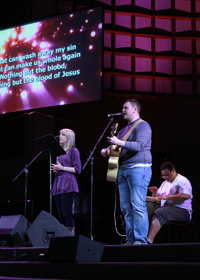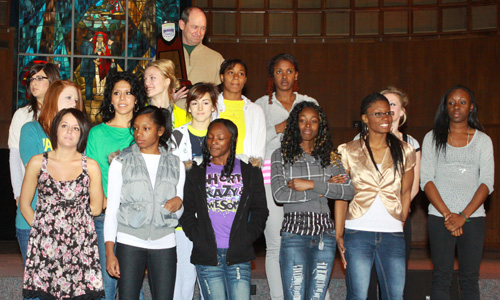Hobbs Lecture Draws Benefits of Rational Theology
March 10, 2011
As they contemplated the nature of God, Christian leaders in 325 A.D. considered that God created people as rational beings, capable of reasoning and solving problems by extrapolating guidance from Scripture.
From that assertion, Dr. Chad Brand discussed the development of reason and progress as he delivered OBU's Hobbs Lecture on Wednesday, March 9.
"In that moment, at that auspicious occasion, rational theology was born," Brand said. "With the birth of rational theology came, eventually, the rise of reason, the rise of innovation in commerce, the rise of science and, eventually, the iPhone. In other words, the notion of progress is an inherently Christian notion."
A scholar, apologist and pastor, Brand presented the lecture Wednesday, March 9, at 10 a.m. Titled "Trinitarian Monotheism, Economics and the American Revolution," the lecture was based on the essay "Good Infection" by C.S. Lewis.
For chapel messages, follow this link.
Brand said the notion of reason and rational speech had never been applied to theological questions before western Christianity -- at the Council of Nicaea nearly 1,700 years ago -- undertook the idea that a discourse could lead to progress in understanding -- and that such progress could then be applied to other disciplines beyond theology. He said a series of episodes in western Christianity, some of them not even connected to one another directly, led to a belief in progress, in science and in human freedom.
He first pointed to Augustine. Among the renowned bishop's contributions to progress and innovation, Brand noted two: an extensive and textured understanding of free will, and the discovery of the self.
"Augustine left this legacy of freedom, and the importance of knowing that we are free moral agents, and that we are free moral agents who are selves, loved by God," he said.
 |
| OBU students Sarah Graham, Jonathan Livingston and Johnathan Flowers lead their peers in worship during the service. Graham is a senior from Ponca City, Okla.; Livingston is a junior from Bixby, Okla.; and Flowers is a junior from Irving, Texas. |
Following the fall of Rome, Brand noted Europeans began using their own reason to make a better world for themselves -- because they believed they could. They improvised to survive, he said, and one of the most interesting and surprising improvisations related to monasteries.
"Along with being places for prayer and meditation, they became places for work, and when people work hard, they become productive." he said. "'Innovation' was not invented by Calvin or the American Puritans, but simply by Christians, employing rational beliefs about work and finance and combining them with biblical teachings about generosity and stewardship. It is not a Calvinist idea, it is a Christian one."
In the mid-12th century, the establishment of universities provided an opportunity for a truly liberal arts education, Brand said, and some of the most creative thinking was done in the theology departments. While Greek thinking was based on arguments and conclusions, the young English theologian William of Occam pointed out, "you can have a valid argument, but still know nothing about the world you live in." Progress in understanding required hypotheses.
"We have to keep in mind that science is more than technology," Brand said. "It is a combination of theory and research."
Occam paved the way for Franics Bacon, who seized Occam's concept of hypothesis and combined it with a strategy for research that led to the scientific method and the rise of modern natural science. Bacon, like Occam, was a Christian, Brand noted.
A famous reformer trained in an Occamist nominalist tradition was Martin Luther. Believing the unpredictable God was out to get him, Luther searched for answers in Scripture. He revised tradition that had evolved into Roman Catholicism and provided Germans, and eventually other Europeans, with an alternative to the Catholic faith.
"His watch cries were 'faith alone and Scripture alone,' and while he did not believe in religious liberty per se in the way we think of that, he did make way for substantial freedom from religious and political tyranny," Brand said.
In 1665, on a diplomatic mission to the city of Cleves, a young scholar named John Locke discovered a city in which several Protestant faiths existed peacefully alongside Roman Catholicism.
"This visit to Cleves brought about a paradigm shift in Locke's thinking," Brand said. "Locke would make a major contribution in the development of a philosophical commitment to religious liberty in England and the Western world in general, as well as to the nature of government in general."
"John Locke bequeathed to the world an impassioned argument for full religious liberty, and it was an argument based on both Scripture and reason," he continued. "It took biblical ideas in directions they had not gone before, and so extended rational theology to that perplexing problem that is still with us today."

The Lady Bison track team from OBU presents their National Championship trophy to the university during the service. OBU successfully defended its national championship March 5, winning the NAIA Women's Indoor Track and Field Championships in Geneva, Ohio.
Brand also discussed how trade which initiated with the Portuguese and their grasp on the "spice islands" contributed to "red-blooded competition for commerce." The Dutch seized the Portuguese and expanded their reach to the Great Lakes area in North America. The Dutch succumbed to the British who surrounded them -- the British who soon were at war with the colonists in 1776. The same year, a Scottish intellectual named Adam Smith published "The Wealth of Nations," a book which contended the wealth of nations exists in productivity. Those ideas were tested in the new nation of America, a land of freedom of speech, freedom of religion, free elections and free markets.
Through the ages, Brand reiterated, Christians have reflected a Trinitarian God who is transcendent and who has given them rationality and the freed to use that rationality in bringing changes to the world.
"We have a rational God who has made us in his image," Brand said. "Hopefully that is part of why we are here today."
"For more than four decades, OBU has emphasized a thorough study of Western Civilization as part of our core curriculum," said Dr. Stan Norman, provost and executive vice president for campus life. "Dr. Brand's lecture summed up the strengths of our commitment to such study. The history of cultural development and Western thought has its roots in a framework established nearly 1,700 years ago. We have greatly benefitted from that history. Dr. Brand's remarks gave our students a fast-paced review of why our curriculum emphasizes such study, and why we see the study and development of rational thought as a worthy pursuit for a Christ-centered university."
Brand serves as professor of Christian theology at The Southern Baptist Theological Seminary in Louisville, Ky. He also serves as associate dean of biblical and theological studies at Boyce College, the seminary's undergraduate school. He maintains a blog titled "Brandishings" which explores the world of theology, church and culture.
The Hobbs Lecture is one of four OBU lectureships designed to help students grow in their knowledge of Baptist theology, Baptist history and studies of the Bible. The lecture continued OBU's annual chapel theme, "Unadorned: A Return to the Simplicity of the Gospel," based on "Mere Christianity" by Lewis.